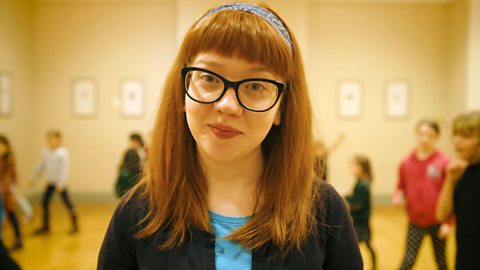Meet Rhianne, 23, who uses her creative and technical skills to design video games. Part of our Bitesize world of work series.
Rhianne:
Hi, I'm Rhianne, I'm 23 years old and I'm a games designer.
So a games designer is somebody who uses their creativity and their technical knowledge in order to create video games. I get to use the latest technology in game development to make video game levels and make video game mechanics to make a really, really cool and fun experience for everyone to play.
So on my day-to-day I get to work with my other amazing developers and we get to brainstorm ideas about how we want the game to play, look and feel. I work alongside code and art. Once they've given me their pieces of work, I get to put it all together in my software and then afterwards test it and play it and see if it's actually any fun.
So growing up, I loved video games. I had my first console when I was about six years old. Me and my dad used to play for hours and hours. I played video games way too much, but it ignited a real big passion for everything creative and everything digital when I was very young.
At school when it came to choosing my GCSEs, I actually chose something called OCR Media because it was way more practical. It combined both IT skills and computer skills with media skills, so I could be creative and technical at the same time, which worked perfectly for me. So when I left school I chose to go to college. I thought I was gonna be a concept artist, but after I chose my BTEC in Games Design and Technology, I realised, actually, I really like design more. So what drew me to design, especially of a concept art was the ability to physically create the world and control what's in it.
So when I finished my BTEC in Game Design. I knew that I wanted to get into game design full time. So I chose a university degree, a Bachelors of Science in Game Design and Technology, which helped me propel myself further into the design aspect of video games. When it came to applying for video game jobs, it was actually super hard, because the industry itself is really competitive, so I had to bring my A game and show off as many skills as possible.
Working in video games is my biggest passion ever. And I can't see myself doing anything else in the entire world. I love the whole creation aspect. I love sitting down and working with my team members to create something that is indescribable and doesn't even exist. But yet, here we are making something for people to just immerse themselves in and enjoy.
Working in video games is my biggest passion ever, and I can't see myself doing anything else in the entire world.
Growing up, Rhianne loved video games and had her first games console at six years old. Her love of games ignited a passion for everything creative and digital
At school she studied GCSE Media Studies, combining IT with media skills, then she did a BTEC in Games Design and Technology at college. Originally intending to be a concept artist, she discovered she liked games design more and so chose a Bachelors of Science in Game Design and Technology
Games design is a very competitive field, so when applying for jobs, she had to make sure she had a portfolio which fully showcased all her skills
Now she works with talented developers and generates ideas about how they want each game to play, look and feel. Working alongside the software development and art teams, she puts their work all together in her software and then plays it to test whether it's actually fun to play!

A similar role to a games designer is a computer games developer. Computer games developers make games that can be played online, and on mobile phones, PCs and games consoles.
What to expect if you want to be a computer games developer
- Computer games developer average salary: £25,000 to £59,000 per year
- Computer games developer typical working hours: 30 to 40 per week
What qualifications do you need to be a computer games developer?
You could get into this role via a university course, a college course (such as an A-level in Computing or a Higher National Diploma, and a T-level (England only) which may lead onto more advanced qualifications or a higher apprenticeship, or help you get a trainee position), an apprenticeship, or work towards the role, particularly if you have an IT qualification or some relevant work experience. Check with your course provider which alternative qualifications they accept.
Sources: LMI for All, National Careers Service, GOV.UK
This information is a guide and is constantly changing. Please check the National Careers Service website for the latest information and all the qualifications needed and the GOV.UK website for more on T-levels.
You can find out more on the Prospects website about the role of a game designer.
For careers advice in all parts of the UK visit: National Careers Service (England), nidirect (Northern Ireland), My World of Work (Scotland) and Careers Wales (Wales).

If you’re interested in becoming a games designer but are not sure if your skill set matches up, take a look at the Wheel of Strengths from Barclays Lifeskills.
It’s a nifty interactive tool you can use to identify your skills, interests and personality. It will also suggest jobs that might suit you and identify how building other skills could open up other job roles.
Take a look - your future awaits!

Work experience in your area
Find work experience placements with Workfinder.
Tips and advice
Help with interviews, writing a CV and all things work experience related.

Pauline: coder. video
Pauline uses code to create and manage websites.

How I turned my hobby into a career
Find out more about Megan's journey.

Anh: illustrator. video
Anh illustrates books and computer games.
